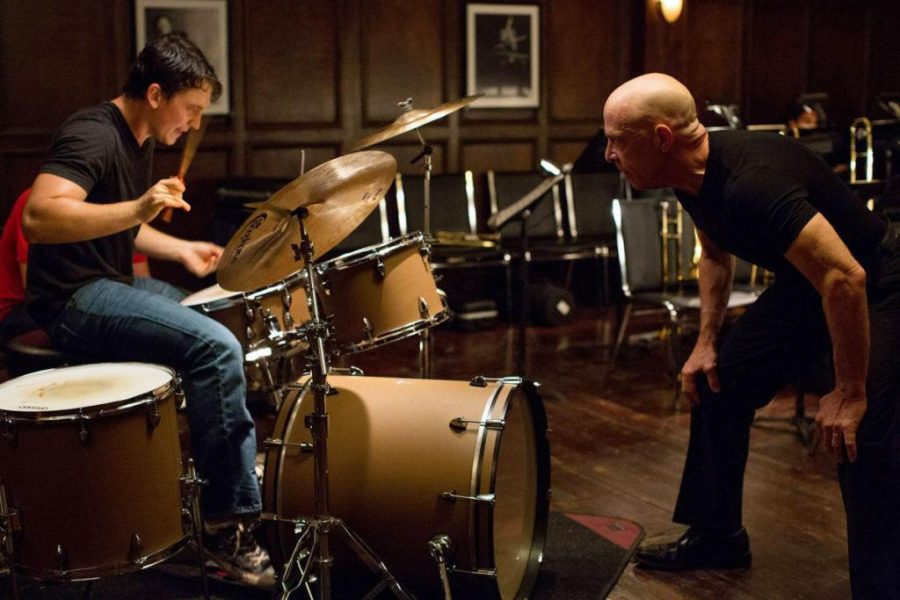The film “Whiplash” meditates on the definitions of success, ambition and failure; indeed, the epic jazz drama by director Damien Chazelle portrays a philosophy both harrowing and utterly inspiring. What first comes across as terrifying and mad-house insane on the screen should be understood for what it is: a keyhole view of excellence and the sort of dedication it takes to become the next “Bird.” Of course, this won’t make sense to those who haven’t seen the film, but stick with me.
In the movie, Andrew Neiman is a young, ambitious drummer at America’s fictional top music school, Shaffer Conservatory. His newly acquired instructor Terence Fletcher is the intensely sociopathic genius leader of Shaffer’s top studio band. Fletcher’s students attend to his every move like one might follow the lead of one’s idol, though it becomes quite apparent this behavior is as much out of fear as it is out of respect. Neiman has an inimitable drive to be the best, to be remembered for his music like his idols, Buddy Rich and Charlie “Bird” Parker. So much so that he spends hours playing until he’s wasted an irresponsible number of Band-Aids and at least one pitcher of ice water. All this to impress the apparently un-impressible Fletcher. So there — you’ve got the basic plot.
Fletcher’s hellacious actions, wicked and vivid in a way hardly describable to those who haven’t witnessed them, get me sweaty with anxiety and obviously psychologically torment Neiman. It’s obvious from the first scene, however, that Neiman is up to Fletcher’s impossible task. He wakes up early. He plays even after his sticks have worn bloody holes in his hands. When he isn’t playing the drums he’s thinking about jazz. Between practices he listens devoutly to CDs of his favorite musicians. He is, in every sense, what I am not but wish I was. Neiman’s refusal to settle for mediocrity is in large and unadvertised part due to his father’s own apparent mediocrity — a high school teacher whom Neiman describes awkwardly to Fletcher as a “writer.”
(WARNING: Video contains very strong language)
https://www.youtube.com/watch?v=xDAsABdkWSc
The movie plays like a scene-to-scene montage of Neiman aspiring to greater than anybody you or I have ever known — sort of like a sweaty Stallone version of a Rocky workout but with drums and for a full hour forty-five. The particularly enlightening scenes are those where Fletcher is allowed to express the philosophy by which he strives to drive students to success. Near the end of the film, he says to Neiman, “There are no two words in the English language more harmful than good job.” To Fletcher, it’s impossible to inspire by extolling a good enough attitude. He goes on to explain that it’s impossible to push anybody too hard, because the next Charlie Parker or Buddy Rich would not become discouraged, for it’s not in the nature of genius to give up no matter the circumstances.
But what’s the final consensus? Critics of the film have berated both its sense of music history and Fletcher’s unabashedly abusive teaching methods. The ending of the film might indeed signify the loss of Nieman’s humanity. Others have argued that genius cannot ever be made by mere practice, even when at the caliber and intensity of Neiman’s Herculean efforts. Genius, some would apparently argue, simply is. I like to think that Neiman’s drive is neither a godlike one nor one that is particular to just him. I like to think, in the part of myself that deals heavily in delusion (and thus hope), that there lurks in each of us the potential to work as hard as Neiman — to follow, no matter how ludicrously or perilously, our dreams.
If this isn’t true, and I truly am kidding myself, why is it that every time I finish watching the film I feel primordially inspired, like I could wake up at 4 a.m. the next day to start a writing project, or jog, or finish all my homework? I think whatever the motivation — a failed parent, say, or a particularly humiliating confrontation with a teacher/mentor — in us lives something that could inspire us to do what we didn’t know we could. This is the message I see in “Whiplash” with all its flashy zeal and sweaty, bloody toil. That although neither of Neiman’s parents are musicians, by drumming at the level of engagement and dedication that he does, he finally achieves an other-worldly moment of transcendent success — a moment of pure genius. Whether any of us will reach genius in the way this fictionalized drummer has is not for me to guess. Neither is it within my bounds to say the film is flawless. What it is, in my view at least, is hopeful. Hopeful that with effort, a fear of failure, a high pain threshold and deep internal motivation, you can actually be excellent.


